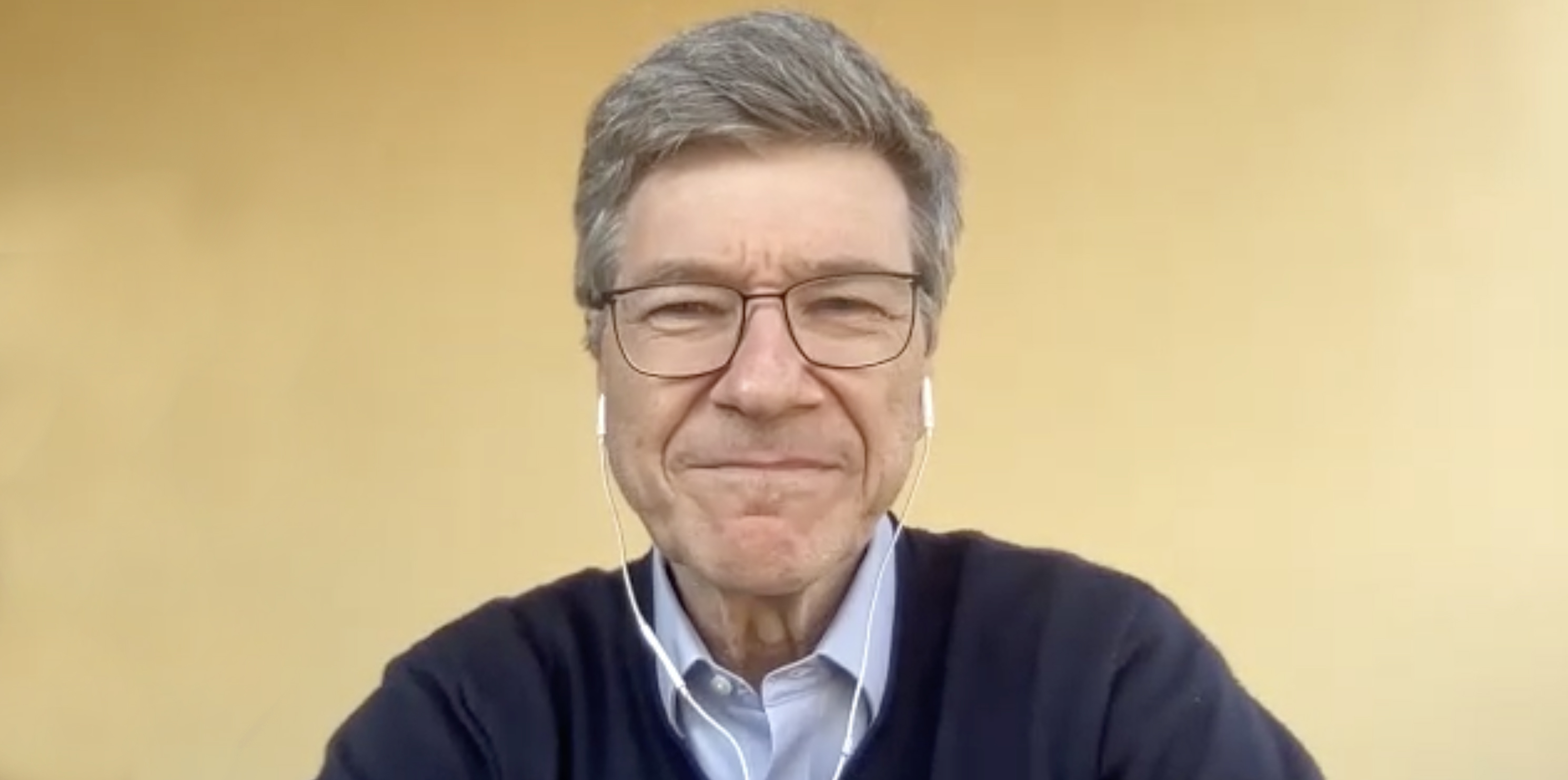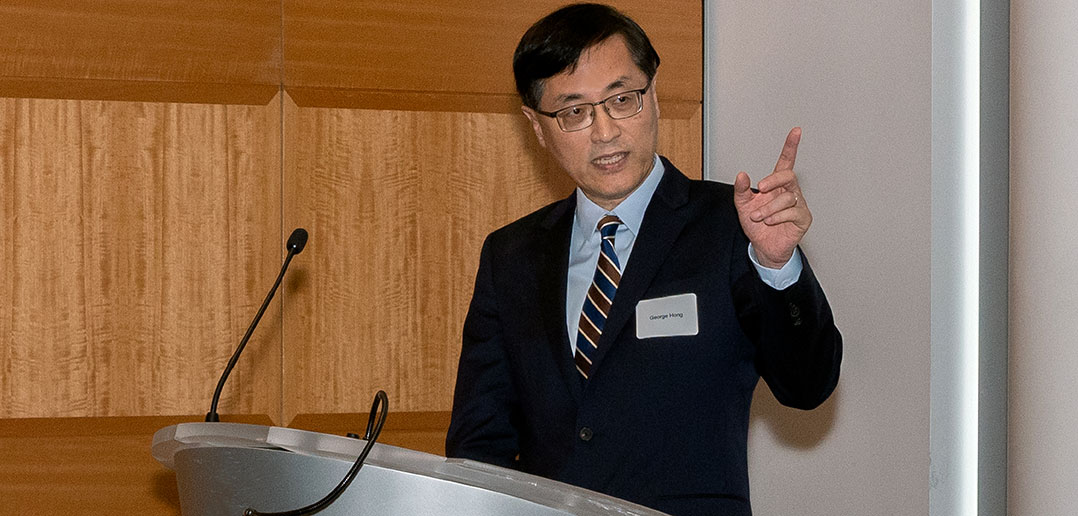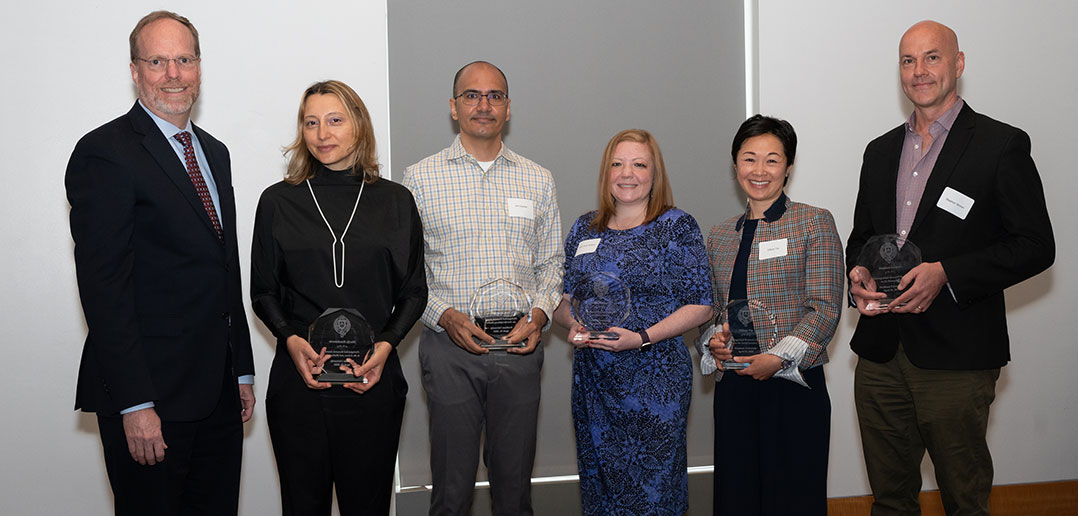Sachs’ talk, delivered via Zoom, was titled “The Role of Universities in Global Sustainable Development.” Though his lecture took a fairly grim view of the current state of academic and political worlds to deal with the dire world crisis, Fordham professors complemented his talk with a more hopeful view through their cross-disciplinary research, which Sachs encouraged in his speech.
But the internationally recognized economist and expert on climate change said that he remains “in a very alarmed state of mind” watching the war in Ukraine, the continued pandemic, and a wealth gap so wide that a single person can decide who is going to take over Twitter while 3 billion people remain deeply malnourished. Yet, he said, academics can be the guiding light.

Jeffrey Sachs addressed the audience via Zoom
“I believe, like the ancient Greeks, that knowledge is the key to wellbeing,” he said. “I am still holding out for our capacity for rationality.”
He then went on to cite Aristotle in saying that rationality is a struggle of every generation.
“That quest for the knowledge and capacity to think clearly for the human good, I think, is at the core of what academia is all about,” he said.
He said the challenge for the world’s universities now, is to promote sustainable development and break free from the silos caused by the “reductionism of modern science.”
“Sustainability to me means an orientation of eudemonia toward the human family,” he said.
“It means taking seriously the complex and interconnected challenges that we face in our world and an understanding that these complexities are well beyond the normal sphere of governance and vastly beyond what a market economy … could even begin to solve. We need a new way of thinking.”
It was a point of view shared by Joseph M. McShane, S.J., president of Fordham, who hailed the faculty audience for practicing the collaborations needed to advance sustainability.
“If look around this room, you realize there’s an attempt to break down silos. Silos really short circuit creativity of any university,” said Father McShane. “Following naturally upon that, there is a great interest in creating networks here.”
Fordham is uniquely positioned to lay the groundwork for global cooperation, he said, as it is a member of “the oldest and largest international network of higher education the world has ever known.”
“There are 181 Jesuit colleges around the world that offer us all sorts of possibilities…to develop a language for dialogue that will lead to the articulation of and an embrace of a new global ethical understanding,” he said.
To that end, Chief Research Officer George Hong, Ph.D., associate vice president for academic affairs, announced that his office will be implementing a Faculty Research Abroad Program with International Jesuit Universities this summer. Seven faculty will work with more than ten Jesuit universities in Europe, Asia, and Latin America to develop research collaborations, he said.
The day’s awards presentation also highlighted collaborative efforts, beginning with an award named for interdisciplinary studies. That award went to Ahir Gopaldas, Ph.D., associate professor of marketing, and the Robert B. McKeon Endowed Chair in Business at the Gabelli School of Business. Gopaldas is examining why on average, people globally spend an average of three hours a day on their phones.
“The research is based on lots of case studies from across disciplines of many different apps, many different users, and many different societies,” he said.
“One of the key themes that we find across the spectrum, whether we’re talking about people obsessed with email or Tinder or TikTok or Facebook or anything on the entire ecosystem of apps, is unpredictability. Unpredictability drives us crazy. The brain craves closure. We’re desperate to know what comes next. That’s what causes the obsession.”
He concluded by saying, “Thank you, you may return to your phones now.”
In breakout sessions highlighting new books by Fordham faculty, several of the presenters cited the work of their colleagues from other disciplines.
In discussing her new book, Radical Sufficiency: Work, Livelihood, and a U.S. Catholic Economic Ethic (Georgetown University Press, 2022), Theology Professor Christine Hinze, Ph.D., director of the Francis and Ann Curran Center for American Catholic Studies, drove the cross-disciplinary approach home.
“The kind of work that this book represents is highly dependent on the kind of work that we’re hearing about from our colleagues,” she said. “That is the work of historians, the work of ethnographers, the work of economists, and so forth. One of my mentors would say theology is a field encompassing other fields by necessity. And I think this is true of ethics as well, right? We can’t speak normatively in any credible way about any of these subjects without grounding these specific realities in ethics.”
The day’s awards went to:
Distinguished Research Award in Humanities:
Stephen Grimm, Ph.D., Professor of Philosophy
Distinguished Research Award in Interdisciplinary Studies:
Ahir Gopaldas, Ph.D., Associate Professor of
Marketing and the Robert B. McKeon Endowed Chair at the Gabelli School of Business
Distinguished Research Award for Junior Faculty:
Alesia Mickle Moldavan, Ph.D., Assistant Professor of Mathematics Education in the Graduate School of Education
Distinguished Research Award in the Science and Mathematics:
Marija Kundakovic, Ph.D., Assistant Professor of Biological Sciences
Distinguished Research Award in Social Sciences:
Tiffany Yip, Ph.D., Chair and Professor of Psychology







